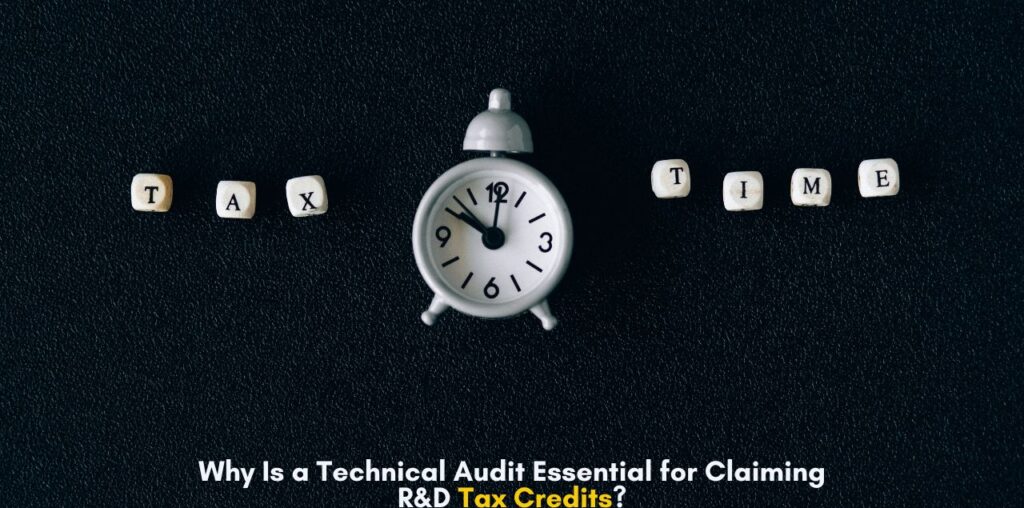Introduction
Businesses investing in research and development (R&D) often seek tax credits to offset their costs. However, securing these credits requires thorough documentation and compliance with regulations. A technical audit plays a crucial role in validating R&D activities, ensuring that businesses can claim eligible expenses while maintaining compliance with tax authorities.
A well-conducted technical audit helps businesses present clear evidence of their R&D efforts, preventing rejections or delays in tax credit claims. Alongside this, audits such as manufacturing audit and ethical audits contribute to maintaining operational efficiency and compliance. Understanding the significance of a technical audit procedure can help businesses optimize their tax claims while staying aligned with industry standards.
Understanding the Role of a Technical Audit in R&D Tax Credits
A technical audit evaluates whether a company’s R&D activities align with the criteria set by tax authorities. It involves a detailed review of projects, expenses, and documentation to ensure compliance with eligibility requirements. Without a proper audit, businesses risk losing out on tax credits due to incomplete or inaccurate claims.
The technical audit procedure involves gathering technical data, assessing the scope of R&D projects, and ensuring that methodologies meet the necessary standards. Companies that fail to conduct a structured audit may face challenges in proving the eligibility of their research activities.
Importance of a Manufacturing Audit in R&D Compliance
For businesses involved in production and innovation, a manufacturing audit is essential to ensure that processes meet industry standards. This type of audit assesses the efficiency, quality, and compliance of manufacturing activities, which can directly impact R&D tax credit claims.
A manufacturing audit checklist helps businesses systematically evaluate production processes, identify inefficiencies, and document improvements that qualify as R&D. Proper documentation through this audit strengthens the case for claiming tax credits by providing tangible evidence of research-driven advancements.
How Ethical Audits Support Transparent R&D Claims
Ethical audits ensure that businesses follow responsible practices in their R&D activities. These audits assess the integrity of operations, including labor practices, environmental impact, and regulatory compliance. The ethical audit process helps businesses maintain transparency and credibility, which is essential when claiming tax credits.
An ethical audit process also demonstrates that R&D activities are conducted within legal and ethical boundaries, reducing the risk of compliance issues. Companies that integrate ethical considerations into their audits can enhance their reputation while securing financial benefits through tax credits.
The Connection Between Insurance Audits and R&D Tax Claims
While technical audits focus on validating R&D activities, an insurance audit plays a key role in assessing risks associated with research projects. A business insurance audit evaluates the coverage needed for R&D investments, ensuring that companies are protected against potential losses.
A well-documented business insurance audit can support R&D tax credit claims by demonstrating that research activities are safeguarded against risks. Companies that integrate insurance considerations into their audit process can optimize financial planning while ensuring compliance with tax regulations.
Best Practices for Conducting a Technical Audit
A successful technical audit requires careful planning and execution. Businesses should follow these best practices to maximize their R&D tax credit claims:
-
Maintain detailed records of all R&D activities, including project timelines, objectives, and expenses.
-
Use a manufacturing audit checklist to document production improvements and innovations.
-
Conduct regular ethical audits to ensure compliance with regulatory and ethical standards.
-
Align insurance coverage with R&D investments to minimize financial risks.
-
Engage professionals to conduct a comprehensive technical audit procedure.
Navigating the complexities of R&D tax credit claims can be challenging, but Corpbiz offers expert guidance to streamline the process. With specialized services in technical audit, manufacturing audit, and business insurance audit, Corpbiz ensures that businesses meet compliance requirements while maximizing financial benefits. By partnering with Corpbiz, companies can confidently claim their R&D tax credits with a structured and transparent approach.
Conclusion
A technical audit is a vital component of claiming R&D tax credits, providing the necessary documentation and validation to secure financial incentives. By incorporating audits such as manufacturing audit, ethical audits, and insurance audit into their compliance strategy, businesses can strengthen their claims while ensuring regulatory adherence. With professional support from Corpbiz, companies can simplify the audit process and focus on driving innovation.



